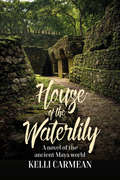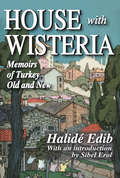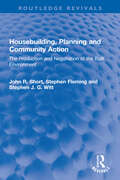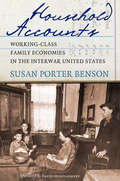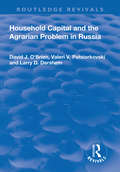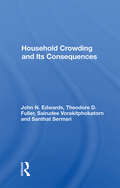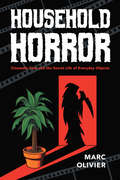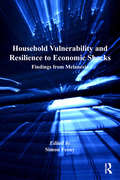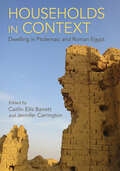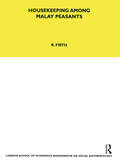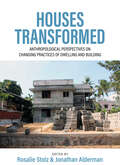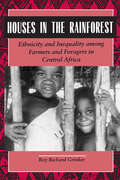- Table View
- List View
House Of Pride
by LondonPublished in the year 2001, House of Pride is a valuable contribution to the field of Asian Studies.
House and Street: The Domestic World of Servants and Masters in Nineteenth-century Rio de Janeiro
by Sandra Lauderdale GrahamThe Brazilian women of 19th century worked as housemaids either as slaves or free. House and Street re-creates the working and personal lives of these women.
House of Lies
by Linda RosencranceKiller DebutanteKelley Cannon was living the American Dream. The former prom queen had three beautiful children with her successful, handsome husband, Jim, and an elegant home in well-to-do Nashville. But when their housekeeper found Jim murdered, strangled to death as their children slept, the fairytale collapsed. Behind the facade, Kelley's glamorous lifestyle was being torn apart by infidelity, alcohol, and drug abuse. When she went from prime suspect to accused, a jury had to decide--How could a 90-pound woman overpower a grown man to death? Their finding: premeditated murder, a life sentence--and a storybook life that masked a dark, violent truth . . . What caused petite, pretty Kelley Cannon to snap? Find out in this page-turning account of a woman who killed her husband. --Burl Barer, Edgar Award-winning Author of Body Count and Head ShotA gripping true-crime shocker. --Burl BarerCase seen on Dateline Includes 16 Pages Of Photos
House of Plenty: The Rise, Fall, and Revival of Luby's Cafeterias
by Carol Dawson Carol JohnstonScarred by the deaths of his mother and sisters and the failure of his father’s business, a young man dreamed of making enough money to retire early and retreat into the secure world that his childhood tragedies had torn from him. But Harry Luby refused to be a robber baron. Turning totally against the tide of avaricious capitalism, he determined to make a fortune by doing good. Starting with that unlikely, even naive, ambition in 1911, Harry Luby founded a cafeteria empire that by the 1980s had revenues second only to McDonald’s. So successfully did Luby and his heirs satisfy the tastes of America that Luby’s became the country’s largest cafeteria chain, creating more millionaires per capita among its employees than any other corporation of its size. Even more surprising, the company stayed true to Harry Luby’s vision for eight decades, making money by treating its customers and employees exceptionally well. Written with the sweep and drama of a novel, House of Plenty tells the engrossing story of Luby’s founding and phenomenal growth, its long run as America’s favorite family restaurant during the post–World War II decades, its financial failure during the greed-driven 1990s when non-family leadership jettisoned the company’s proven business model, and its recent struggle back to solvency. Carol Dawson and Carol Johnston draw on insider stories and company records to recapture the forces that propelled the company to its greatest heights, including its unprecedented practices of allowing store managers to keep 40 percent of net profits and issuing stock to all employees, which allowed thousands of Luby’s workers to achieve the American dream of honestly earned prosperity. The authors also plumb the depths of the Luby’s drama, including a hushed-up theft that split the family for decades; the 1991 mass shooting at the Killeen Luby’s, which splattered the company’s good name across headlines nationwide; and the rapacious over-expansion that more than doubled the company’s size in nine years (1987–1996), pushed it into bankruptcy, and drove president and CEO John Edward Curtis Jr. to violent suicide. Disproving F. Scott Fitzgerald’s adage that “there are no second acts in American lives,” House of Plenty tells the epic story of an iconic American institution that has risen, fallen, and found redemption—with no curtain call in sight.
House of Tudor: A Grisly History
by Mickey MayhewForty-five gruesome but not gratuitous accounts from the Tudor reign, including the death of Richard III and the botched execution of Mary Queen of Scots. This decidedly darker take on the Tudors, from 1485 to 1603, covers a whole host of horrors from the Tudor reign. Particular attention is paid to the various gruesome ways in which the Tudors despatched their various villains and lawbreakers, from simple beheadings, to burnings and of course the dreaded hanging, drawing and quartering. Other chapters cover the various diseases prevalent during Tudor times, including the dreaded &“Sweating Sickness&”—rather topical at the moment, unfortunately—as well as the cures for these sicknesses, some of which were considered worse than the actual disease itself. The day-to-day living conditions of the general populace are also examined, as well as various social taboos and the punishments that accompanied them, i.e. the stocks, as well as punishment by exile. Tudor England was not a nice place to live by twenty-first-century standards, but the book will also serve to explain how it was still nevertheless a familiar home to our ancestors. &“He does not shy away from the gory details, which adds another element to stories that are familiar to those who are Tudor fans. If you want something spooky to read in October or know more about the darker side of Tudor history, I recommend reading House of Tudor.&” —Adventures of a Tudor Nerd &“It really does cover so many different things that there will be something for everyone whatever your interests are; political, personal, medical, or death. A brilliant gory discourse on my favourite period of history!&” —Tudor Blogger
House of War: The Pentagon and the Disastrous Rise of American Power
by James Carroll"A masterful achievement...[Carroll's] prose is elegant, his viewpoint bold." —Howard Zinn, author of The People's History of the United States"One cannot understand the impact of the Pentagon on US foreign policy. . . without reading James Carroll's House of War." —Lawrence Korb, former Undersecretary of Defence under Ronald ReaganFrom the National Book Award–winning author of An American Requiem and Constantine's Sword comes a sweeping yet intimate look at the Pentagon and its vast—often hidden—impact on America.This landmark, myth-shattering work chronicles the most powerful institution in America, the people who created it, and the pathologies it has spawned. James Carroll proves a controversial thesis: the Pentagon has, since its founding, operated beyond the control of any force in government or society. It is the biggest, loosest cannon in American history, and no institution has changed this country more. To argue his case, he marshals a trove of often chilling evidence. He recounts how "the Building" and its denizens achieved what Eisenhower called "a disastrous rise of misplaced power"—from the unprecedented aerial bombing of Germany and Japan during World War II to the "shock and awe" of Iraq. He charts the colossal U.S. nuclear buildup, which far outpaced that of the USSR, and has outlived it. He reveals how consistently the Building has found new enemies just as old threats—and funding—evaporate. He demonstrates how Pentagon policy brought about U.S. indifference to an epidemic of genocide during the 1990s. And he shows how the forces that attacked the Pentagon on 9/11 were set in motion exactly sixty years earlier, on September 11, 1941, when ground was broken for the house of war.Carroll draws on rich personal experience (his father was a top Pentagon official for more than twenty years) as well as exhaustive research and dozens of extensive interviews with Washington insiders. The result is a grand yet intimate work of history, unashamedly polemical and personal but unerringly factual. With a breadth and focus that no other book could muster, it explains what America has become over the past sixty years.
House of the Waterlily: A Novel of the Ancient Maya World
by Kelli CarmeanSet in the Maya civilization's Late Classic Period House of the Waterlily is a historical novel centered on Lady Winik, a young Maya royal. Through tribulations that mirror the political calamities of the Late Classic world, Winik's personal story immerses the reader not only in her daily life, but also in the difficult decisions Maya men and women must have faced as they tried to navigate a rapidly changing world. Kelli Carmean's novel brings to life a people and an era remote from our own, yet recognizably human all the same.
House with Wisteria: Memoirs of Turkey Old and New
by Halide EdibThis edition of Halide Edib Adivar's Memoirs, prefaced with Sibel Erol's excellent introduction, is important and timely. When stereotypes of women in the Muslim world abound, Halide's memoirs remind us of the courage and dedication of "foremothers" who struggled for emancipation at both personal and national levels. These memoirs open a window on the search for personal expression of a woman caught up in the oppressive dynamics of her polygamous households (parental and marital), and the travails of national liberation and nation-building in Turkey, in which she played an active role. Halide speaks to us with an urgency which now cries out to be heard more than ever.Halide Edib's memoirs are indispensable reading for anyone interested in the history of childhood and education in the late Ottoman Empire. Edib worked to spread public education, instituting schools in Istanbul and in the Arab provinces during World War I. Her account is vibrant and direct, off ering an excellent witness to this critical period during which the Empire collapsed.Halide Edib lived through the most turbulent times in modern Turkish history. Most unusually for a woman of her day, she did so not only as an eyewitness, but as an active political participant. She was on close personal terms with powerful leaders such as Talat Pasha and Ataturk, but retained a critical and independent mind. All this gives her memoirs their unique character. The book provides new light on the Ottoman Empire and the Turkish nation.
House/Garden/Nation: Space, Gender, and Ethnicity in Postcolonial Latin American Literatures By Women
by Ileana Rodríguez Ileana Rodríguez Robert CarrHow ironic, the author thought on learning of the Sandinista's electoral defeat, that at its death the Revolutionary State left Woman, Violeta Chamorro, located at the center. The election signaled the end of one transition and the beginning of another, with Woman somewhere on the border between the neo-liberal and marxist projects. It is such transitions that Ileana Rodrguez takes up here, unraveling their weave of gender, ethnicity, and nation as it is revealed in literature written by women. In House/Garden/Nation the narratives of five Centro-Caribbean writers illustrate these times of transition: Dulce Mara Loynz, from colonial rule to independence in Cuba; Jean Rhys, from colony to commonwealth in Dominica; Simone Schwarz-Bart, from slave to free labor in Guadeloupe; Gioconda Belli, from oligarchic capitalism to social democratic socialism in Nicaragua; and Teresa de la Parra, from independence to modernity in Venezuela. Focusing on the nation as garden, hacienda, or plantation, Rodrguez shows us these writers debating the predicament of women under nation formation from within the confines of marriage and home. In reading these post-colonial literatures by women facing the crisis of transition, this study highlights urgent questions of destitution, migration, exile, and inexperience, but also networks of value allotted to women: beauty, clothing, love. As a counterpoint on issues of legality, policy, and marriage, Rodriguez includes a chapter on male writers: Jos Eustacio Rivera, Omar Cabezas, and Romulo Gallegos. Her work presents a sobering picture of women at a crossroads, continually circumscribed by history and culture, writing their way.
Housebuilding, Planning and Community Action: The Production and Negotiation of the Built Environment (Routledge Revivals)
by Stephen Fleming John R. Short Stephen J. WittFirst published in 1986, Housebuilding, Planning and Community Action was written as an examination of the conflicts and tensions resulting from private sector housing growth in Central Berkshire, part of Britain’s ‘Silicon Valley’ along the M4 motorway. The book provides a detailed consideration of the various ‘actors’ and their interactions and explores the fight from Community groups and parish councils to halt development, in opposition to the government’s reluctance to discourage economic growth. It focuses on four groups closely involved in the production, allocation, and consumption of new housing: speculative housebuilders, local planning authorities, parish councils, and community/residents’ groups. The motivations and actions of each group are examined, and the tensions between them are highlighted, set within the context of central government attitudes towards planning and private housebuilding. Housebuilding, Planning and Community Action has lasting relevance for those interested in human geography, and the history of housebuilding and planning.
Household Accounts: Working-Class Family Economies in the Interwar United States
by David Montgomery Susan Porter BensonWith unprecedented subtlety, compassion and richness of detail, Susan Porter Benson takes readers into the budgets and the lives of working-class families in the United States between the two world wars. Focusing on families from regions across America and of differing races and ethnicities, she argues that working-class families of the time were not on the verge of entering the middle class and embracing mass culture. Rather, she contends that during the interwar period such families lived in a context of scarcity and limited resources, not plenty. Their consumption, Benson argues, revolved around hard choices about basic needs and provided therapeutic satisfactions only secondarily, if at all. Household Accounts is rich with details Benson gathered from previously untapped sources, particularly interviews with women wage earners conducted by field agents of the Women's Bureau of the Department of Labor. She provides a vivid picture of a working-class culture of family consumption: how working-class families negotiated funds; how they made qualitative decisions about what they wanted; how they determined financial strategies and individual goals; and how, in short, families made ends meet during this period. Topics usually central to the histories of consumption--he development of mass consumer culture, the hegemony of middle-class versions of consumption, and the expanded offerings of the marketplace--contributed to but did not control the lives of working-class people. Ultimately, Household Accounts seriously calls into question the usual narrative of a rising and inclusive tide of twentieth-century consumption.
Household Capital and the Agrarian Problem in Russia
by David J O'Brien Valeri V Patsiorkovski Larry D DershemThis title was first published in 2000: Using micro-level data, this text shows that rural Russian households have made significant adaptations to an emerging market economy in just a few years. It focuses on how household capital (household labour, social networks and comunity attachment) effect the economic and psychological adaptation of households to rapid socioeconomic change. Findings are from 1995 to 1997 panel surveys made in three waves. The book deals systematically with micro-level processes of household adaptation to a market economy, institutional change and emerging informal and formal patterns of land tenure and use in Russia. It shows how structural changes are occurring in rural Russia and their impact on household enterprise development and income. Difference in household capital explains the emergence of inequality in the countryside and differences in the degree to which households experience stress and a higher or lower subjective quality of life.
Household Crowding And Its Consequences
by John EdwardsThis book examines the social and psychological impact of household congestion in the context typical of the developing world on psychological wellbeing, marital and family relations, sibling relations, violence within the family, the impact on marital sex and reproductive behavior.
Household Horror: Cinematic Fear and the Secret Life of Everyday Objects (The\year's Work: Studies In Fan Culture And Cultural Theory Ser.)
by Marc OlivierA scholar examines 14 everyday objects featured in horror films and how they manifest their power and speak to society’s fears.Take a tour of the house where a microwave killed a gremlin, a typewriter made Jack a dull boy, a sewing machine fashioned Carrie’s prom dress, and houseplants might kill you while you sleep. In Household Horror, Marc Olivier highlights the wonder, fear, and terrifying dimension of objects in horror cinema. Inspired by object-oriented ontology and the nonhuman turn in philosophy, Olivier places objects in film on par with humans, arguing, for example, that a sleeper sofa is as much the star of Sisters as Margot Kidder, that The Exorcist is about a possessed bed, and that Rosemary’s Baby is a conflict between herbal shakes and prenatal vitamins. Household Horror reinvigorates horror film criticism by investigating the unfathomable being of objects as seemingly benign as remotes, radiators, refrigerators, and dining tables. Olivier questions what Hitchcock’s Psycho tells us about shower curtains. What can we learn from Freddie Krueger’s greatest accomplice, the mattress? Room by room, Olivier considers the dark side of fourteen household objects to demonstrate how the objects in these films manifest their own power and connect with specific cultural fears and concerns.“Provides a lively and highly original contribution to horror studies. As a work on cinema, it introduces the reader to films that may be less well-known to casual fans and scholars; more conspicuously, it returns to horror staples, gleefully reanimating works that one might otherwise assume had been critically “done to death” (Psycho, The Exorcist, The Shining).” —Allan Cameron, University of Auckland
Household Politics
by Don HerzogEarly modern English canonical sources and sermons often urge the subordination of women. In Household Politics, Don Herzog argues that these sources were blatherâ "not that they were irrelevant, but that plenty of people rolled their eyes at them. Indeed many held that a man had to be an idiot or a buffoon to try to act on their hoary â œwisdom.â ? Households didnâ TMt bask serenely in naturalized or essentialized patriarchy. Instead, husbands, wives, and servants struggled endlessly over authority. Nor did some insidiously gendered public/private distinction make the political subordination of women invisible. Conflict, Herzog argues, doesn't corrode social order: it's what social order usually consists in. He uses the argument to impeach conservatives and their radical critics for sharing confused alternatives. The social world Herzog brings vibrantly alive is much richerâ "and much pricklierâ "than many imagine.
Household Registration System Reform in China's Megacities
by Xizhe PengThis book examines the impact of population growth and urbanization on the household registration system in China. Drawing on experiences from other countries in population management, it proposes a general framework for reforming the household registration system in China. This framework is based on the principle of "equity of rights and obligations" and includes a points system to guide implementation. The book also analyzes the economic implications of optimizing restrictions on urban household registration and the fiscal reforms associated with the reform. The practicality of the points system program is further verified.
Household Vulnerability and Resilience to Economic Shocks: Findings from Melanesia (Economic Geography Series)
by Simon FeenyFocusing on the vulnerability and resilience to economic shocks at the household level, this book draws on extensive research activities carried out in two Melanesia countries: the Solomon Islands and Vanuatu. In particular, it identifies the household impacts of the recent food, fuel and economic crises. The contributors also examine resilience by identifying how households responded to these recent economic events in order to cope with their impacts. Findings indicate that households are vulnerable to a range of shocks and often struggle to cope with their impacts. Shocks are making it harder for households to meet their basic needs. Households in Melanesia are facing increasing demands for money, in particular for school fees, basic foodstuffs and customary obligations. Concurrently, there are limited domestic opportunities for formal employment. Traditional social support networks are strong and are an important form of resilience. However, there is evidence that they are disintegrating. Of particular focus are the gendered impacts. Women are found to bear a disproportionate share of the burden in adjusting to household shocks. The authors highlight key areas in which public policy and development programmes can reduce household vulnerability and increase their resilience to future economic shocks.
Household Workers Unite
by Premilla NadasenTelling the stories of African American domestic workers, this book resurrects a little-known history of domestic worker activism in the 1960s and 1970s, offering new perspectives on race, labor, feminism, and organizing. In this groundbreaking history of African American domestic-worker organizing, scholar and activist Premilla Nadasen shatters countless myths and misconceptions about an historically misunderstood workforce. Resurrecting a little-known history of domestic-worker activism from the 1950s to the 1970s, Nadasen shows how these women were a far cry from the stereotyped passive and powerless victims; they were innovative labor organizers who tirelessly organized on buses and streets across the United States to bring dignity and legal recognition to their occupation.Dismissed by mainstream labor as "unorganizable," African American household workers developed unique strategies for social change and formed unprecedented alliances with activists in both the women's rights and the black freedom movements. Using storytelling as a form of activism and as means of establishing a collective identity as workers, these women proudly declared, "We refuse to be your mammies, nannies, aunties, uncles, girls, handmaidens any longer."With compelling personal stories of the leaders and participants on the front lines, Household Workers Unite gives voice to the poor women of color whose dedicated struggle for higher wages, better working conditions, and respect on the job created a sustained political movement that endures today.From the Hardcover edition.
Household and City Organization at Olynthus
by Nicholas CahillOlynthus, one of the best-preserved ancient Greek cities, was excavated in the 1920s and 1930s, revealing more than a hundred houses and their exceptionally complete contents. In this copiously illustrated book, Nicholas Cahill analyzes this archaeological information and provides important new insights into the daily lives of the ancient Greeks, the organization of their public and domestic space, and the economic and social patterns in Olynthus.
Households and Financialization in Europe: Mapping Variegated Patterns in Semi-Peripheries (RIPE Series in Global Political Economy)
by Marek MikušHouseholds and Financialization in Europe develops a processual, relational and critical transdisciplinary approach to household financialization in Europe, utilizing a range of national and local case studies. It does so by drawing on debates in Marxist, feminist and radical IPE, anthropology and other fields. The book explores the household as simultaneously a micro-level social institution specializing in social reproduction, distribution and other activities; a building bloc of larger economic and social structures; and an object of multiple systems of power/knowledge. Putting this conceptualization to use in original research, the authors identify geographically and historically situated ways in which financialization transforms households and their relationships with the wider economy and society. The book traces these transformations in case studies of variegated financialization in Eastern and Southern European (semi-) peripheries where households have faced particularly severe financial issues since the global financial crisis, such as over-indebtedness and asset devaluation. Key themes recurring throughout the book include: the key role of housing in household financialization, the co-constitutive relationship between financialization and social and spatial inequalities, specific patterns in the relations of financial actors and households in semi-peripheries, and the implications of semi-peripheral forms of real and financial accumulation for household financialization. With its transdisciplinary approach, this book will be of great interest to students and scholars of finance, financialization, household economics, international and global political economy, uneven development, economic anthropology, and economic sociology. The Introduction of this book is freely available as a downloadable Open Access PDF at http://www.taylorfrancis.com under a Creative Commons Attribution CC-BY 4.0 license.
Households in Context: Dwelling in Ptolemaic and Roman Egypt
by Caitlín Eilís Barrett Jennifer CarringtonHouseholds in Context shifts the focus from monumental temples, tombs, and elite material and visual culture to households and domestic life to provide a crucial new perspective on everyday dwelling practices and the interactions of families and individuals with larger social and cultural structures. A focus on households reveals the power of the everyday: the critical role of quotidian experiences, objects, and images in creating the worlds of the people who live with them. The contributors to this book share contemporary research on houses and households in both Ptolemaic and Roman Egypt to reshape the ways we think about ancient people's lived experiences of family, community, and society. Households in Context places the archaeology and history of Greco-Roman Egypt in dialogue with research on dwelling, daily practice, and materiality to reveal how ancient households functioned as laboratories for social, political, economic, and religious change.Contributors: Youssri Abdelwahed, Richard Alston, Anna Lucille Boozer, Paola Davoli, David Frankfurter, Jennifer Gates-Foster, Melanie Godsey, Darlene L. Brooks Hedstrom, Sabine R. Huebner, Gregory Marouard, Miriam Müller, Lisa Nevett, Bérangère Redon, Bethany Simpson, Ross I. Thomas, Dorothy J. Thompson
Housekeeping among Malay Peasants (London School Of Economics Monographs On Social Anthropology Ser. #Vol. 7)
by Rosemary FirthInitially published in 1966. A study of the social and economic conditions of a small fishing village in Kelantan, on the north-east coast of Malay. The study, from August 1939 to July 1940 is based on collaborations with the author's husband's investigations explores how the Kelantan people use their money, manage resources, their behaviour, how religion affects theie day to day lives, and their standard of living.
Houses Transformed: Anthropological Perspectives on Changing Practices of Dwelling and Building
by Rosalie Stolz Jonathan AldermanOver the decades, there has been a world-wide transformation of so-called ‘vernacular houses’. Based on ethnographic accounts from different regions, Houses Transformed investigates the changing practices of building houses in a transnational context. It explores the intersection of house biographies and social change, the politics of housing design, the social fabrication of aspirational houses, the domestication of concrete and the intersection of materiality and ontology as well as the rhetoric of the vernacular. The volume provides new anthropological pathways to understanding the dynamics of dwelling in the 21st century.
Houses in the Rainforest: Ethnicity and Inequality Among Farmers and Foragers in Central Africa
by Roy Richard GrinkerThis is the first ethnographic study of the farmers and foragers of northeastern Zaire since Colin Turnbull's classic works of the 1960s. Roy Richard Grinker lived for nearly two years among the Lese farmers and their long-term partners, the Efe (Pygmies), learned their languages, and gained unique insights into their complex social relations and ethnic identities. By showing how political organization is structured by ethnic and gender relations in the Lese house, Grinker challenges previous views of the Lese and Efe and other farmer-forager societies, as well as the conventional anthropological boundary between domestic and political contexts.
Houses of Ill Repute: The Archaeology of Brothels, Houses, and Taverns in the Greek World
by Allison Glazebrook Barbara TsakirgisThe study of ancient Greek urbanism has moved from examining the evidence for town planning and the organization of the city-state, or polis, to considerations of "everyday life." That is, it has moved from studying the public (fortifications, marketplaces, council houses, gymnasiums, temples, theaters, fountain houses) to studying the private (the physical remains of Greek houses). But what of those buildings that housed activities neither public nor private—brothels, taverns, and other homes of illicit activity? Can they be distinguished from houses? Were businesses like these run from homes? Classical Athenian writers attest to a diverse urban landscape that included tenement houses (sunoikiai), inns (diaitai, pandokeia), factories (ergasteria), taverns (kapelia), gambling dens (skirapheia), training schools (didaskaleia), and brothels (porneia), yet, despite our knowledge of specific terms, associating them with actual physical remains has not been easy. One such writer, Isaeus, mentions tenement houses that hosted prostitutes and wine sellers, while his contemporary Aeschines refers to doctors, smiths, fullers, carpenters, and pimps renting space. Were tenement houses not simply multi-inhabitant spaces but also multipurpose ones?Houses of Ill Repute is the first book to focus on the difficulties of distinguishing private and semiprivate spaces. While others have studied houses or brothels, this volume looks at both together. The chapters, by leading scholars in the field, address such questions as "What is a house?" and "Did the business of prostitution leave behind a unique archaeological record?" Presenting several approaches to identifying and studying distinctions between domestic residences and houses of ill repute, and drawing on the fields of literature, history, and art history and theory, the volume's contributors provide a way forward for the study of domestic and entertainment spaces in the Hellenic world.Contributors: Bradley A. Ault, Allison Glazebrook, Mark L. Lawall, Kathleen M. Lynch, David Scahill, Amy C. Smith, Monika Trümper, Barbara Tsakirgis.






